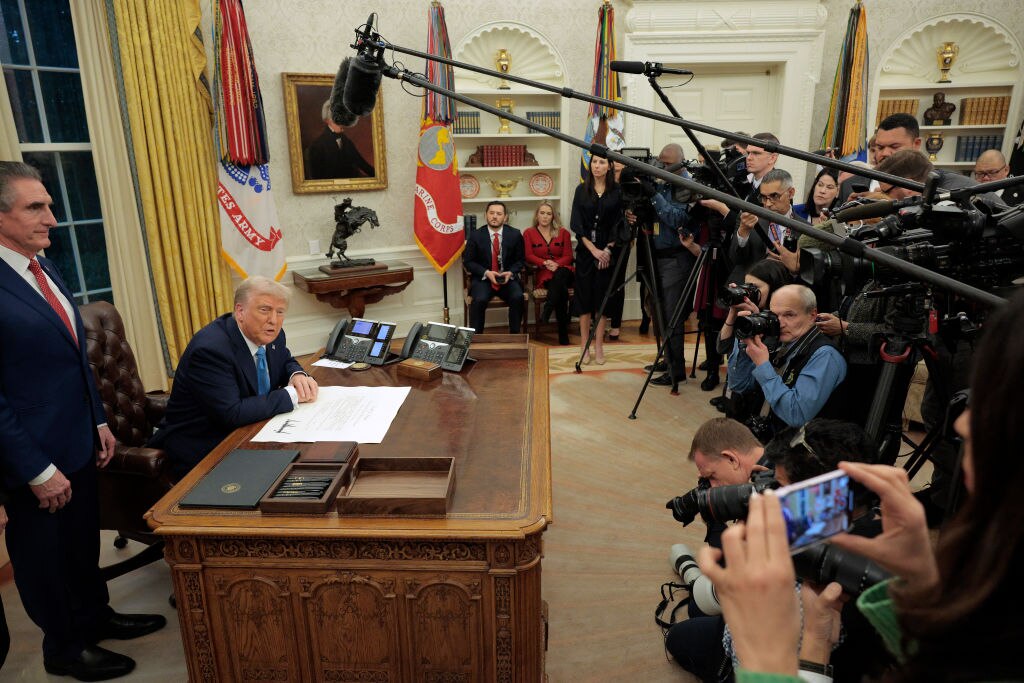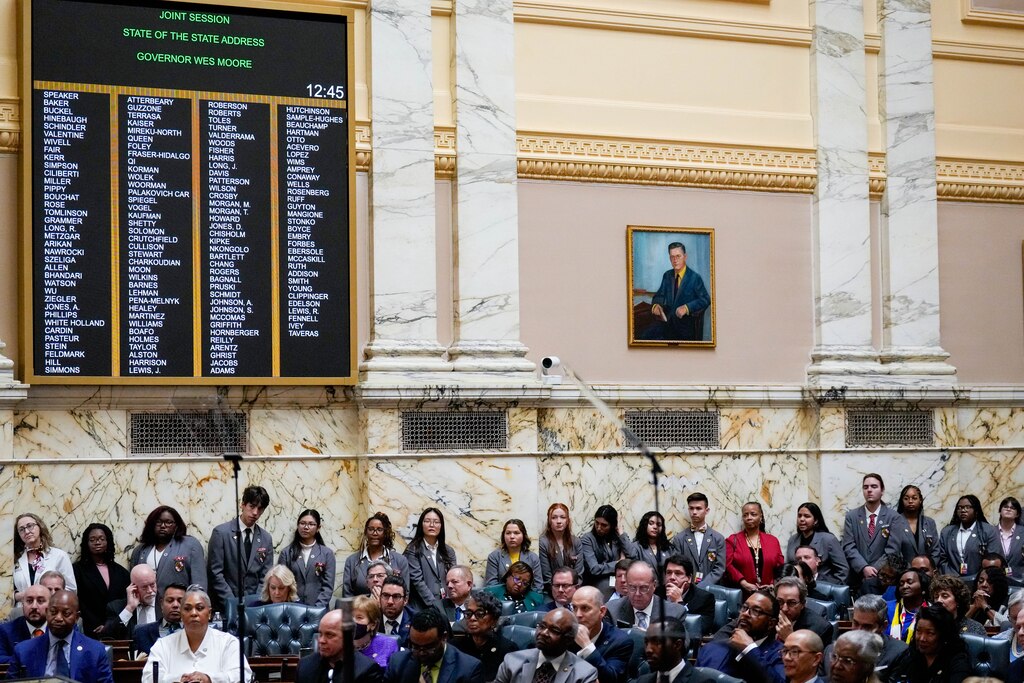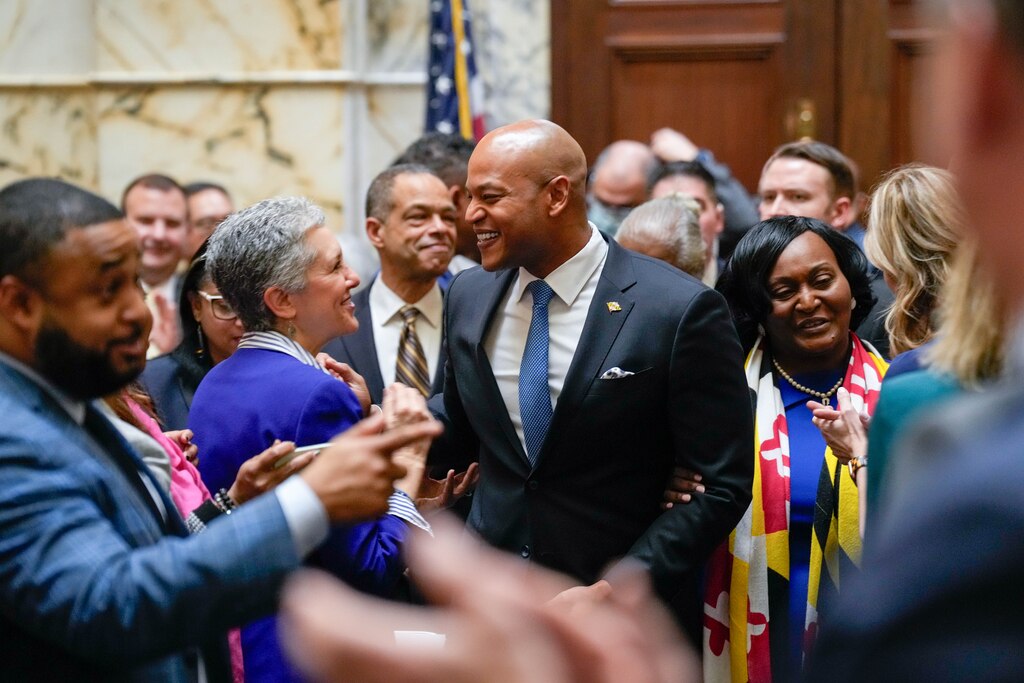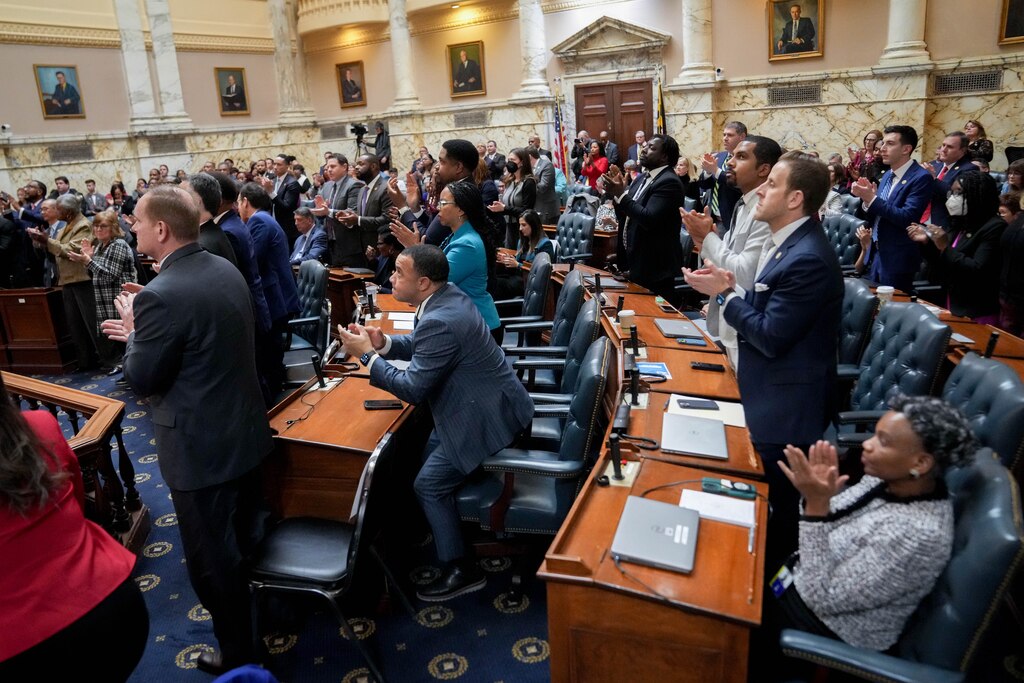Maryland Gov. Wes Moore pledged Wednesday to guide the state through turbulent times caused by uncertainty from the new presidential administration and a sluggish local economy. But he acknowledged it won’t be easy.
Delivering his annual State of the State address, the Democratic governor sought to assure both lawmakers and Marylanders at large that while difficult times lie ahead, the state can rise to the occasion.
The Democratic governor described two storms threatening Maryland: The state’s projected long-term budget deficit and “the danger” of new leadership in Washington, D.C.
“Now, those two storms have made landfall,” Moore said. “And our job isn’t simply to batten down the hatches. We must prove that when Maryland was tested, we met the moment.”
The Baltimore Banner thanks its sponsors. Become one.
Moore didn’t explicitly mention Republican President Donald Trump, whose dizzying array of early actions in his second presidential term have state and local officials scrambling to understand the consequences.
But Moore made clear the threats that are posed by “a new administration in Washington that sows uncertainty, confusion and chaos.”

And he said the president’s actions to freeze federal funding and halt diversity programs “mark a shift in longstanding norms between Washington and Maryland — norms that have been preserved by leaders of both parties and all backgrounds.”
“At a time when our nation needs clarity, we confront chaos. At a time when our nation needs vision, we confront hysteria,” Moore said. “The trials we now face — both those we inherited and those newly realized — mean that easy decisions are off the table.”
Underscoring his point, Moore said: “We only have difficult decisions ahead.”
The Baltimore Banner thanks its sponsors. Become one.
A pitch for his budget plan
Moore said his approach has three pillars: investing in growing sectors of the economy, reforming the tax system and investing in “our people.”
He spent significant time in his speech promoting his budget proposal and plans for economic growth.
Facing a nearly $3 billion gap between money coming into state coffers and planned spending, Moore has proposed raising taxes on high earners; lowering the corporate tax but closing a corporate tax loophole; increasing the state’s cut of gambling and sports betting profits; and adding a 75-cent fee on many home deliveries. He also proposed cutting back planned spending, including on services for people with developmental disabilities and for the Blueprint for Maryland’s Future education plan.

Moore touted his estimate that 82% of taxpayers will see a modest tax cut or no change under his plan. And the governor again noted that he would pay more in taxes as one “who has done exceptionally well financially.”
“I am OK with paying a little more if it means we don’t have to lay off firefighters or police officers,” he said. “I’m OK with it if it means we can have the best public schools in America. I’m OK with it if it means we can have the resources to actually grow our economy and be strategic about the way that we grow.”
The Baltimore Banner thanks its sponsors. Become one.
Revisiting education ‘Blueprint’
Moore’s plan also includes a revamp of the Blueprint for Maryland’s Future, a multiyear plan aimed at improving the quality of the state’s public schools. His proposed changes have been criticized because they result in a slowing of funding increases for educating low-income students and English-language learners.
Moore said he would focus on recruiting and retaining “world class” educators, one of the key parts of his proposed legislation that would revamp the Blueprint.
The governor acknowledged the lawmakers before him who created and passed the Blueprint plan — “one of the most ambitious and important pieces of education reform in American history” — and promised that he’s dedicated to seeing it through, even with adjustments.
Without naming names, Moore suggested the prior governor (Republican Larry Hogan) and former state schools superintendent (Karen Salmon) weren’t on board with implementing the Blueprint plan.
“This administration remains committed to delivering on the promise of the Blueprint for Maryland’s Future,” he said to applause.
The Baltimore Banner thanks its sponsors. Become one.
Addressing lawmakers, Moore said: “All of you did the work to create it. Together, we will do the work to make sure it is implemented effectively — and you have my word on that.”
Despite the governor’s appeal to lawmakers, not all are on board with his proposed changes.
Del. Vanessa Atterbeary, who chairs the House committee that oversees education, said she disagrees “100%” with the governor’s proposed changes to the Blueprint for Maryland’s Future.
Atterbeary said the cuts affect children and teachers who need the most support, including kids who are from low-income families and who are learning English.
“As far as we stand right now, we are not changing the Blueprint,” said Atterbeary, a Howard County Democrat.
The Baltimore Banner thanks its sponsors. Become one.
Addressing the needs of ‘men and boys’
Moore also announced a new focus on “supporting and elevating our men and boys.”
The governor noted troubling statistics of rising suicide rates, low college attendance and high incarceration rates.
“The data is telling us a clear message: We need to better understand and address what’s happening with our men and boys,” Moore said.
The governor gave few specifics, but said he wants to remove barriers that keep men out of the workforce, including those returning from incarceration.
He also promoted legislation he’s sponsoring to expand options for people to have their criminal records expunged for violations of parole and probation.
The Baltimore Banner thanks its sponsors. Become one.
“If we want to truly unleash the power of Maryland’s labor force, we need to make sure our men and boys aren’t still falling behind,” Moore said.
Moore said he will be directing his “entire administration” to implement “targeted solutions to uplift our men and boys.”
Warm reception

Moore gave his 47-minute speech to a packed joint session of the House of Delegates and state Senate in the State House. He entered the chamber to a rousing round of applause, as expected in a legislature that’s nearly three-quarters Democrats.
As Moore made his way up the aisle to the dais, he was met with handshakes and high-fives from lawmakers.
Applause punctuated his speech numerous times, including when he praised first responders who handled the plane and helicopter crash in the Potomac River, when he ran through improving statistics on crime and unemployment, and when he pledged to use state dollars to promote economic growth in information technology, life sciences and aerospace engineering.
At the end, Moore grasped the hands of House of Delegates Speaker Adrienne A. Jones and Senate President Bill Ferguson, and thrust them into the air, grinning broadly.
Some Democrats said they were buoyed by Moore’s focus on making tough choices in difficult times.
“The challenges are immense and they change daily,” said Del. Courtney Watson, a Howard County Democrat. “And we are all working as hard as we can to solve the problems that are before us.”

Sen. Will Smith, a Montgomery County Democrat, called Moore’s speech “a blueprint for some semblance of stability in a very uncertain time.”
“Obviously, with a budget shortfall and unsteady hand in the White House, Maryland is in a vulnerable position,” Smith said.
Moore got a small shout when he mentioned planned improvements to Interstate 81 in Western Maryland and cheers for other road projects.
“I’m loving the Montgomery County-Western Maryland battles going on right now,” he chuckled, a line not included in his prepared remarks.
Republican response
Republican lawmakers walked away from Moore’s speech with unanswered questions.
House Minority Leader Jason Buckel said the speech was a lot of “smoke and mirrors” designed to camouflage Maryland’s significant spending. Though Moore’s tax proposal would mostly raise income tax on the state’s highest earners, Buckel said every Marylander would feel the result of new fees proposed in the governor’s budget.
“What we’re doing is having very very substantial tax increases,” said Buckel, who represents Allegany County. “They are not just going to fall on the people who make the kind of money Wes Moore makes.”

Sen. Stephen Hershey, the Senate minority leader, said Moore fell short in addressing the entire budget picture, which also includes projected deficits in future years.
“We need to address the out years, as well, and nothing came up with that,” said Hershey, who represents the Eastern Shore.
Del. Jesse Pippy, the House minority whip from Frederick County, criticized Moore for taking “shots” at the new presidential administration.
Pippy warned that Moore’s “tone” may not be well-received by Trump, who is known for retaliating against people he perceives as political enemies.
“We talked about the Key Bridge today,” Pippy said. “That bridge will not get built without federal support. I hope (Moore) takes a better tone. Taking shots at the Republican-controlled House, the White House, is not a good way to start a partnership, particularly when Maryland has dug a hole that we’re over-reliant on the federal government to begin with.”
In remarks recorded ahead of Moore’s speech, Buckel sounded a similar theme of tough decisions, but in less stark terms than Moore.
“At this moment, Maryland is truly at a crossroads,” Buckel said.
Buckel’s remarks, which aired on public television after Moore’s address, took aim at several Democratic policies, from Moore’s proposed tax hikes and “environmental activism gone wild” to the ambitious and expensive Blueprint for Maryland’s Future education improvement plan.
This is a developing story.


Comments
Welcome to The Banner's subscriber-only commenting community. Please review our community guidelines.